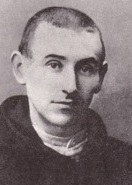Marie-Joseph Cassant
Marie-Joseph Cassant (born March 6, 1878 in Casseneuil , † June 17, 1903 in Bellegarde-Sainte-Marie , Haute-Garonne ) was a French Trappist who was beatified by the Catholic Church in 2004 (name day: June 17) .
life and work
The short life
Joseph Cassant, nephew of two nuns, attended the school of the Brothers of the Christian Schools in his hometown and felt called to the priesthood from the age of 14. On the advice of the local priest, he entered on December 5, 1894 the age of 16 in the 1852 Aiguebelle Abbey , founded Trappist monastery Sainte-Marie du Désert (Peugniez S. 216) in Bellegarde-Sainte-Marie and took the religious name Marie-Joseph on . He made his temporary profession on January 17, 1897 and perpetual profession on May 24, 1900 and was ordained a deacon on February 22, 1902, and a priest on October 12 of the same year. Eight months later, the monk, who had been exempted from military service in 1900 because of his poor health, died of tuberculosis.
Discreet holiness
A decisive factor in Cassant's spiritual career was his novice master André Malet , later abbot of the monastery (1911–1936), who recognized his deep religiosity and led him lovingly. His confreres valued him as a monk who was always balanced and smiling in a friendly manner. His ideal was to live the present with patience, hope and love, according to his motto: “Everything for Jesus, everything through Mary” ( Tout pour Jésus, tout par Marie ). The sentence passed down from him is: "I will always remember that life as a monk must be an alienation of oneself, from morning to evening, the longer, the more" ( Je me rappellerai toujours que la vie religieuse doit être un renoncement à soi-même, du matin au soir, de plus en plus grand ). He endured the cruel features of his illness (too weak to stand, close to suffocating when lying down, plagued by scabs while sitting) as a personal way of the cross . Of his discreet holiness one could say: “There was nothing extraordinary in his life, except the extraordinaryness with which he did the ordinary; nothing big, except the size with which he did the little things ”( Rien d'extraordinaire, sauf la façon extraordinaire dont il fit les choses ordinaires; rien de grand, sauf la grandeur avec laquelle il fit les petites choses ).
Reception and beatification
In 1926 the booklet Deux Fleurs du Désert (about him and Pierre Vigne , 1670–1740) published by his monastery drew attention to him for the first time. 1938 appeared in the same monastery publisher L'âme cistercienne du Père Marie-Joseph Cassant (d'après ses notes inédites) by Marie-Étienne Chenevière (1906–1972). In 1950 Marguerite Dufaur published Sous le signe de Dieu. Le Père Joseph Cassant, trappiste (Paris, Spes, 1950, foreword by Cardinal Jules Saliège ). In 1956, based on numerous testimonies to the effectiveness of invocations, the beatification process was initiated. In 1961, Father Chenevière dedicated the biography L'Attente dans le silence to him. Le Père Marie-Joseph Cassant, O. Cist. SO (Paris / Löwen, Desclée de Brouwer, 1961, 1981, foreword by Thomas Merton ). Cassant's virtue was recognized in 1984 by Pope John Paul II , who beat him on October 3, 2004. In the meantime another piece of writing about him had appeared: Robert Masson, Joseph Cassant. Les inaperçus de Dieu (“God's inconspicuous saints”, Saint-Maur, Parole et silence, 2001). In 2006 the Bellefontaine Abbey published its correspondence (by Robert Balayé, Pierre-André Burton and Jean-Christophe Christophe). In 2008, Father Jean-Christophe Christophe dedicated the work Demeurer dans le coeur de Jésus to him (after his first work, Brother Marie-Joseph Cassant. "L'instinct du bonheur" , Mesnil-Saint-Loup, Éditions du Livre ouvert, 2001) . Bienheureux Marie-Joseph Cassant (Flavigny-sur-Ozerain, Traditions monastiques, 2008; foreword by Jean-Marie Couvreur).
Appreciation
Dom Jean-Marie Couvreur, abbot of the Sainte-Marie du Désert monastery from 1987 to 2013, said of Cassant: "It is good for us to see Father Cassant in his weakness, his mistakes and his human inadequacies. He has accepted everything and got the best out of himself thanks to his ardent love for Jesus. So he became a completely God-oriented person who lived only out of him and for him. He is one of the little ones, for whom we can only thank God, because his Life gives us an inkling that the kingdom of love is also being offered to us, already here and today, and this despite our weakness, vulnerability and smallness. " ( Il nous est bon de regarder le P. Cassant dans sa faiblesse, avec ses failles et ses manques humains. Il a pu y faire vraiment face et développer le meilleur de lui-même grâce à l'amour de Jésus qui brûlait son cœur. Il est devenu un homme totalement tourné vers Dieu, ne vivant que de Lui et pour Lui. Il est l'un de ces petits pour lesquels nous pouvons rendre grâces à Dieu car sa vie nous laisse entrevoir que le Royaume de l'Amour nous est aussi proposé, dès à présent, quelles que soient nos faiblesses, notre fragilité, notre petitesse. )
Further literature
- Bernard Peugniez: Le guide routier de l'Europe cistercienne. Wit des lieux. Patrimoine. Hôtellerie , Editions du Signe, Strasbourg 2012.
Web links
- Literature by and about Marie-Joseph Cassant in the SUDOC catalog (Association of French University Libraries)
- Biographical Documentation (French)
- Father Cassant in the Cistercian Lexicon
- Appreciation of the Blessed on zenit.de
- (Frère Jean-Christophe, "Frère Marie-Joseph Cassant, here et aujourd'hui", in: Collectanea Cisterciensia 66, 2004, pp. 66–72) (PDF)
| personal data | |
|---|---|
| SURNAME | Cassant, Marie-Joseph |
| ALTERNATIVE NAMES | Cassant, Joseph |
| BRIEF DESCRIPTION | French Trappist who was beatified by the Catholic Church in 2004 |
| DATE OF BIRTH | March 6, 1878 |
| PLACE OF BIRTH | Casseneuil |
| DATE OF DEATH | June 17, 1903 |
| Place of death | Bellegarde-Sainte-Marie, Haute-Garonne department |
